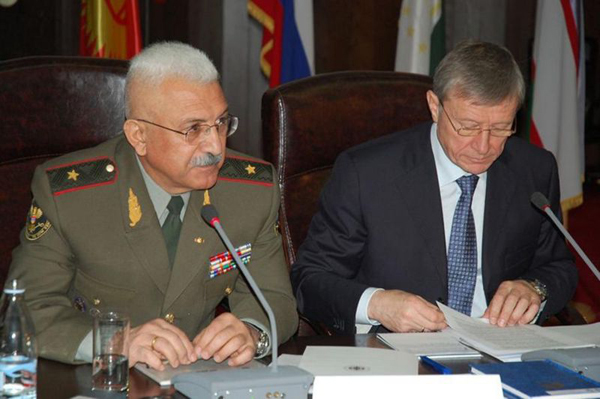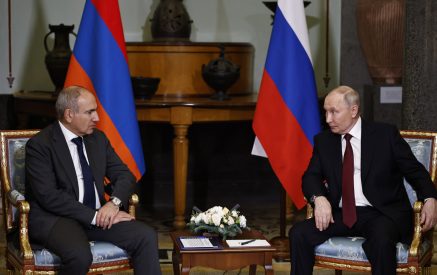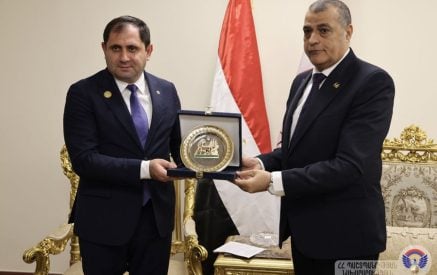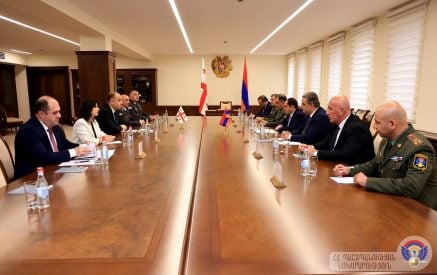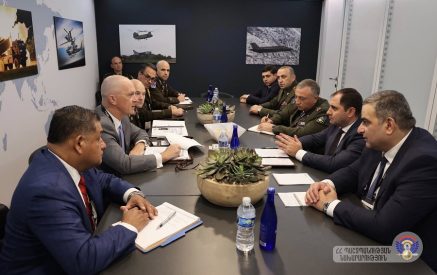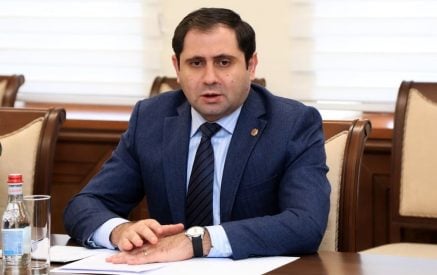On November 18, 2013, at the Academic Council Hall of MGIMO University in Moscow under the chairmanship of the Speaker of the Federation Council of the Federal Assembly of the Russian Federation Valentina Matvienko, a session of the Integration Club entitled “The community of historical roots as a factor in the formation of the Eurasian Union” took place.
At the Club session speeches were delivered by Valentina Matvienko – Chairman, Integration Club, Anatoly Torkunov ‒ Rector, Moscow State University of International Relations, MGIMO University of the Russian MFA; Alexander Chubaryan – Director, Institute of the World History, Russian Academy of Sciences; Yevgeny Primakov ‒ Academic Director, Center for Situational Analysis, Russian Academy of Sciences; Sergey Glazyev ‒ Advisor to the President of the RF on Issues of Regional Economic Integration; Victor Sadovnichy – Rector, Moscow State University named after Lomonosov; Mikhail Shvydkoj – Special Representative of the Russian President for International Cultural Cooperation; Hayk Kotanjian (Armenia) ‒ Head, Institute for National Strategic Studies after D. Kanayan, MOD; Alexander Dzasokhov ‒ Deputy Chairman, Commission of the Russian Federation on UNESCO Affairs; Ruslan Grinberg – Director, Institute of Economics, Russian Academy of Sciences; Konversky Anatoly (Ukraine) – Dean, Philosophy Department, Kyiv National University after Taras Shevchenko.
Here is the text of the presentation delivered by Hayk Kotanjian, Head, INSS, MOD, RA ̶ Advisor of the RA Minister of Defense on Defense Policy, Doctor of Political Science (RF), Visiting Professor at the US INSS, NationalDefenseUniversity, Full Member of the RF Academy of Military Sciences, Member of the Academic-Expert Council of the CSTO. It is noteworthy that the main security guidelines of the Republic of Armenia are re-affirmed by Doctor Kotanjian from the podium of the Integration Club of the Speaker of the Federation Council of the RF Valentina Matviyenko on the eve of the meeting of the Presidents of Armenia and Azerbaijan Serzh Sargsyan and Ilham Aliyev on the resolution of the Karabakh conflict, in the run-up to the Vilnius summit on the “Eastern Partnership” and the visit of the Russian Federation President Vladimir Putin to Armenia.
“THE STRATEGIC DIALOGUE AS A KEY FACTOR FOR PROMOTING
Read also
INTEGRATION IN THE EURASIAN SPACE
Your Excellency, the Honorable Valentina Ivanovna!
Dear Colleagues!
Since Armenia gained independence in 1991, the cornerstone of its foreign policy has been the complementarity and the desire to build partnerships both with the neighboring states and with power centers involved in the security dynamics formation of the South Caucasus. This choice reflects the geopolitical imperatives of the efficiency of the independent Armenian state as a guarantor of the sustainable development and security of the ten-million Armenians of the Republic of Armenia, the Nagorno-KarabakhRepublic, and the Diaspora. Meanwhile, we should note that the complementarity in the foreign policy of Armenia does not mean equal and similar relations with all partners. The strategic ally and number one security partner for Armenia is Russia. Armenia successfully complements the bilateral security strategic alliance with Russia with the strategic partnership with her and other states within the framework of the CSTO. The key to the deep and creatively updated dialogue between Armenia and Russia is the multi-vector search for optimal integration solutions by Moscow itself that is based on the innovative interpretation of Peter the Great’s strategic guidelines for the development of both the Asian and European dimensions of the Russian statehood’s modernization.
Armenia also keeps productive contacts with the Euro-Atlantic power centers such as the United States, NATO and the EU. Since 2005, Armenia has effectively implemented the programs within the scope of NATO’s Individual Partnership Action Plan aimed at promoting the defense security reforms. My nation has also been enriching the experience of participation in the international security system through peacekeeping operations in Iraq, Kosovo, and currently in Afghanistan.
Since 2009, Armenia has been the member of the EU’s Eastern Partnership Program, and over the last three years – along with the consultations on the possibility to join the Customs Union ‒ she negotiated the signing of the Association Agreement with the EU. In September 2013, Armenia made a pragmatically calibrated decision to join the Customs Union, and in the future – to participate in the formation of the Eurasian Economic Union. This decision is largely due to the military-security realities in the South Caucasus, as well as to the symmetric and asymmetric threats and challenges to the security, caused by the armed conflicts and mutinies in the surrounding region.
At the same time, Armenia continues the cooperation with the EU aimed at furthering relations in the areas of democratic reforms, human rights, cooperation in science, education and culture.
In this context, we should note the initiative of the Institute for National Strategic Studies of the Ministry of Defense of the Republic of Armenia to conduct international Strategic Policy Forums with the participation of the CSTO member states’ leading organizations, such as MGIMO University; the Russian Institute for Strategic Studies under the President of the Russian Federation; Kazakhstan Institute for Strategic Studies under the President of Kazakhstan; Information-Analytical Center under the Administration of the President of the Republic of Belarus; Kyrgyzstan Institute for Strategic Analysis and Forecast, as well as with the engagement of our Western partners, including Harvard and Oxford Universities; US National Defense University; American Foreign Policy Council; Chatham House; Jerusalem University; Istanbul Kadir Has University etc. These fora – as an intellectual platform for the discussion of regional security and stability issues at the academic-expert level – provide an opportunity to consider in the academic format different approaches to the solution of thorny security problems and to exchange messages that orient the interested parties of the dialog to the search of constructive solutions.
At the last Forum, the CSTO’s Secretary General Mr. Nikolay Bordyuzha put forward the proposal of the joint organization by the CSTO Secretariat and the RA Ministry of Defense of Annual Strategic Policy Fora in Yerevan with the involvement of not only the CSTO member states but also the power centers interested in the security and stability in the CSTO’s area of responsibility. This idea was supported by the President of Armenia the Honorable Mr. Serzh Sargsyan.
On the basis of the synthesis of the most effective academic-organizational and methodological achievements of the leading think tanks of Russia, the US and Europe, and in cooperation with them, the project to establish the Armenian National Defense Research University is being implemented, the research basis of which is the Armenian INSS. The University may become a new constructive platform for the discussion, in synergic cooperation of both scholars and policy makers, of focal security problems not only in the CSTO’s area of responsibility but also in the neighboring regions.
We can expect, that the forthcoming visit of the Head of the Russian State to Armenia will help to clarify the strategic horizons of the allied cooperation between our two friendly states in the context of the security dialogue between the West and the East – so essential for guaranteeing international security and sustainable development of the people in our volatile region, as well as in Eurasia and the World at large.
In this context, the agenda of the Eurasian integration prospects may be one of the priorities of Strategic Policy Fora of the ArmenianNationalDefenseResearchUniversity”.
- See MG, INSS Head Hayk Kotanjian’s interview at the session of the Integration Club under the chairmanship of the Speaker of the Federation Council of the Federal Assembly of the Russian Federation Valentina Matvienko, MGIMOUniversity, Moscow, November 18, 2013,
https://vmeste-rf.tv/news/29531.do




















































